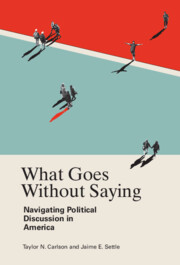Book contents
- What Goes Without Saying
- What Goes Without Saying
- Copyright page
- Contents
- Figures
- Tables
- Acknowledgements
- 1 Opening the Black Box of Political Discussion
- 2 The 4D Framework of Political Discussion
- 3 Data Collection
- 4 Detection
- 5 Decision
- 6 Discussion
- 7 [further] Discussion
- 8 Determination
- 9 Individual Dispositions and the 4D Framework
- 10 The Costs of Conversation
- Notes
- Works Cited
- Index
8 - Determination
When Discussion Divides Us (Stage 4)
Published online by Cambridge University Press: 26 May 2022
- What Goes Without Saying
- What Goes Without Saying
- Copyright page
- Contents
- Figures
- Tables
- Acknowledgements
- 1 Opening the Black Box of Political Discussion
- 2 The 4D Framework of Political Discussion
- 3 Data Collection
- 4 Detection
- 5 Decision
- 6 Discussion
- 7 [further] Discussion
- 8 Determination
- 9 Individual Dispositions and the 4D Framework
- 10 The Costs of Conversation
- Notes
- Works Cited
- Index
Summary
Chapter 8 considers Stage 4 of the feedback loop: Determination. We examine how individuals anticipate relationships changing after political conversations and how discussion behavior is correlated with social distancing and social polarization. We use nationally representative survey data to capture individuals’ reflections on their own social distancing behaviors as well as their projections of such behavior onto hypothetical characters in vignette experiments. We uncover that about a quarter of Americans have distanced themselves socially from a friend because of politics. Americans have done so in a variety of ways, including stopping all political discussion, forbidding their children from playing together, and severing all social ties completely. Vignette experiments revealed that individuals are more likely to avoid future political and social interactions with others who disagree with them. Using data from the 2018 Cooperative Congressional Elections Project, we find that strong partisans in the most like-minded discussion networks were more likely to be socially polarized, compared to strong partisans who were in disagreeable discussion networks.
Keywords
- Type
- Chapter
- Information
- What Goes Without SayingNavigating Political Discussion in America, pp. 180 - 201Publisher: Cambridge University PressPrint publication year: 2022

